Key takeaways:
- Hospital ministry provides essential spiritual support to patients and families, emphasizing the importance of emotional and spiritual care alongside physical health.
- Non-profit work plays a critical role in addressing healthcare gaps, fostering community, and promoting empathy, leading to significant positive impacts on individuals and families.
- Empathy in healthcare enhances patient-provider relationships, improves trust, and facilitates a more holistic treatment approach that significantly affects recovery and well-being.
- Volunteer experiences in healthcare settings promote personal growth, with small acts of kindness creating profound changes both for patients and the volunteers themselves.
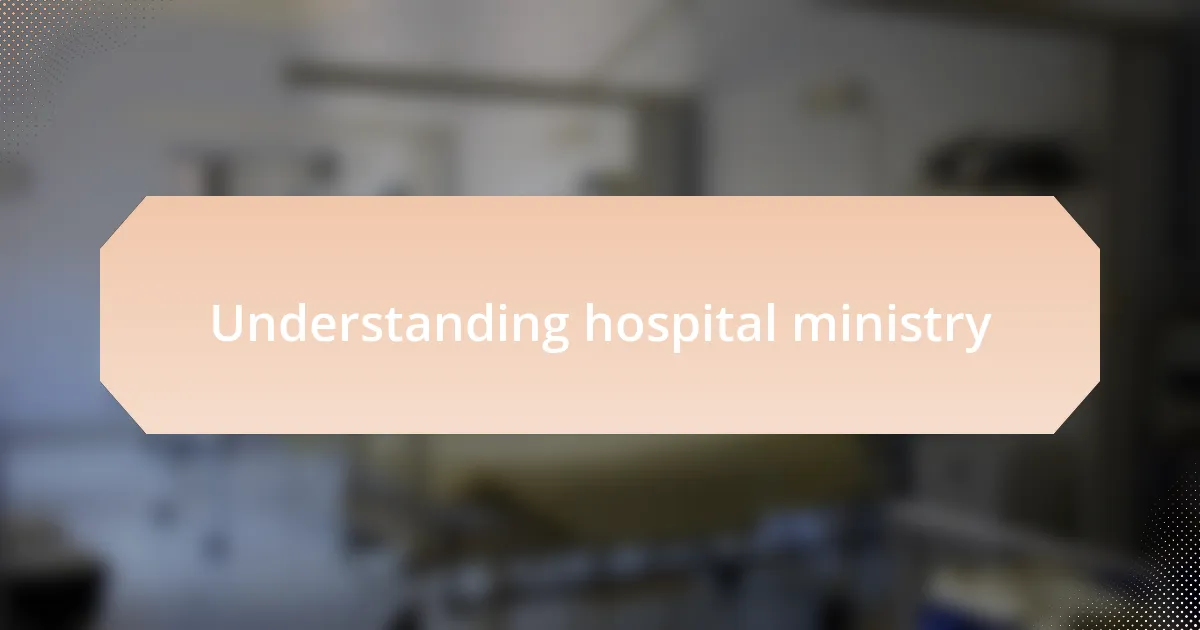
Understanding hospital ministry
Hospital ministry plays a vital role in offering spiritual support to patients and their families during some of life’s most challenging moments. I remember a time when I witnessed a chaplain comforting a family faced with a terminal diagnosis. It was a reminder that our emotional and spiritual needs are just as important as our physical health in these moments.
What fascinates me about hospital ministry is the diverse ways it can manifest. From providing prayers to facilitating bereavement support, the services often adapt to meet the unique needs of each patient. Have you ever considered how a simple conversation or a listening ear can bring solace to someone who feels utterly alone in a sterile hospital room?
Engaging with the hospital environment can also be transformative for the volunteers and staff involved. I’ve felt an incredible sense of purpose and fulfillment when offering support to someone in need. Each interaction not only nurtures the soul of others but also enriches our own, creating a beautiful cycle of care and compassion.
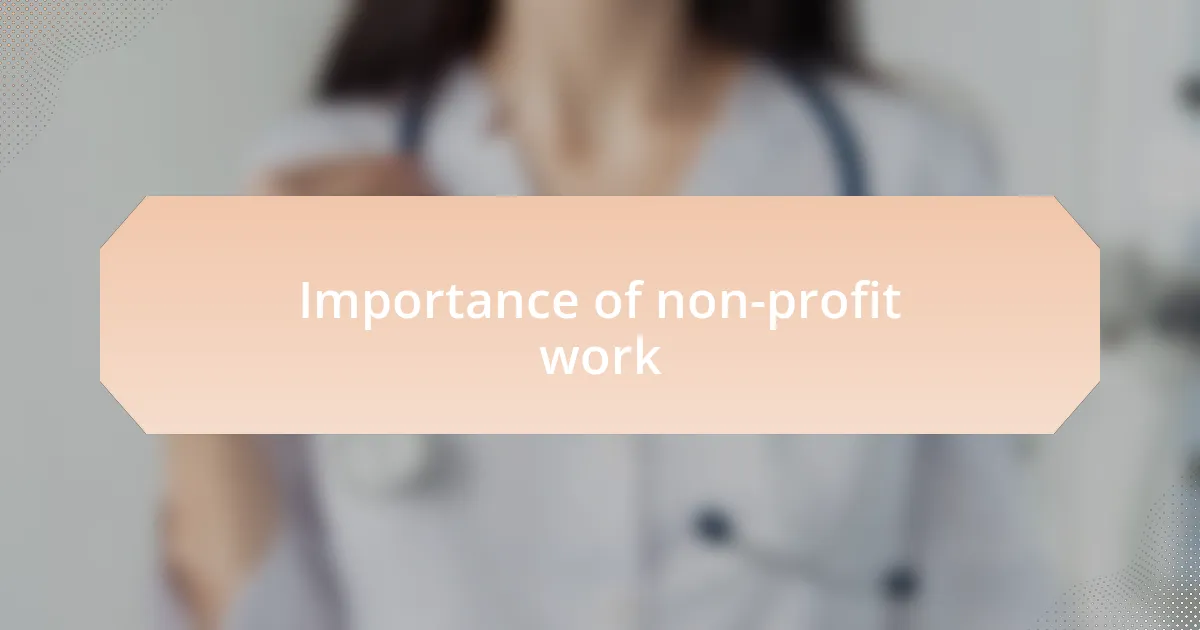
Importance of non-profit work
Non-profit work is crucial for addressing gaps that often exist in public services, particularly in health care settings. During my time volunteering, I saw firsthand how non-profit organizations can reach underserved populations, offering essential resources and services that would otherwise remain inaccessible. Isn’t it inspiring to think about how much impact a few dedicated individuals can have by stepping into those spaces?
Moreover, the heart of non-profit work lies in its commitment to community; it fosters a sense of belonging and social responsibility. I recall working alongside a small team to organize a health fair in a low-income area. The enthusiasm from community members who felt seen and valued was palpable. It makes me wonder—what if more people were encouraged to join such initiatives? The ripple effect of collective goodwill can lead to profound change in the lives of individuals and families.
Lastly, non-profit organizations embody the principle of compassion-driven service. I’ve often felt a deep connection with those we serve, reminding me that empathy is foundational in any healing process. When we prioritize the needs of others, we not only uplift those around us but also cultivate a more supportive and understanding society. How often do we stop to reflect on the power of kindness? Sometimes it takes just one act of care to spark a movement of change.
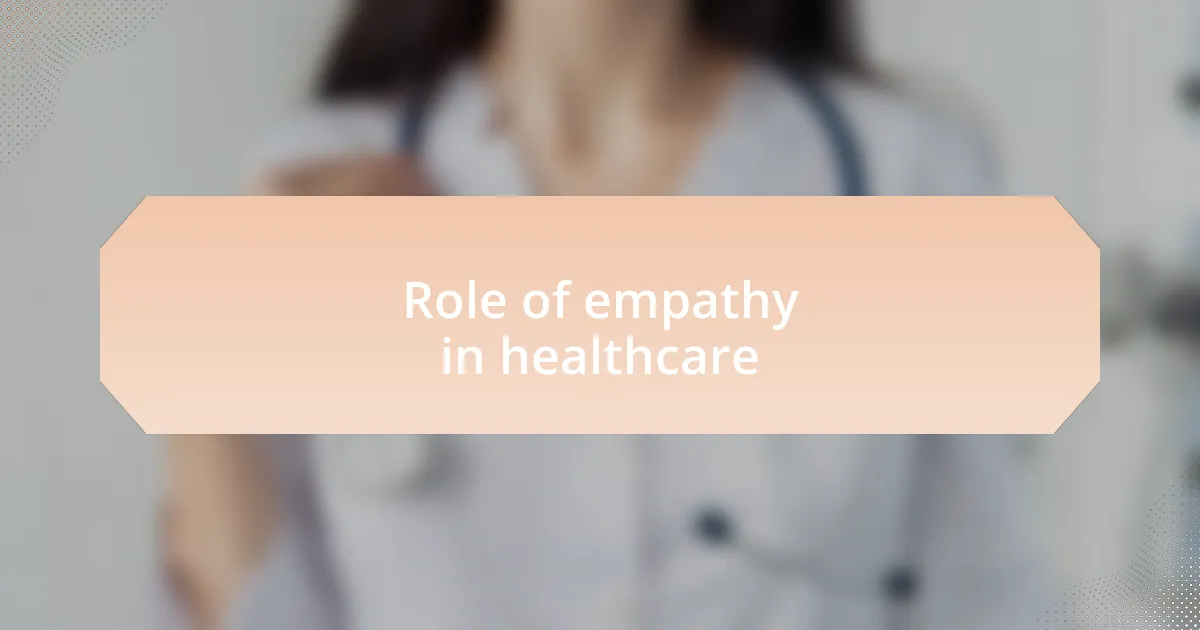
Role of empathy in healthcare
Empathy in healthcare is not just about understanding; it is about genuinely connecting with those we serve. I remember a time when I sat with a patient who was overwhelmed by fear of a diagnosis. By simply listening and offering a comforting presence, I could see how that small gesture lifted a weight off their shoulders. Isn’t it remarkable how sharing in another’s vulnerability can transform their experience?
When healthcare professionals integrate empathy into their practice, it fosters a more holistic approach to treatment. In one instance, I observed a doctor who took the time to explain a complex procedure with compassion and clarity. This not only alleviated the patient’s anxiety but also made them feel valued as an individual rather than just a number. Don’t you think that such moments of connection can significantly impact recovery and overall well-being?
Ultimately, empathy acts as a bridge between healthcare providers and patients, enhancing trust and cooperation. My encounters in hospitals have shown me that when caregivers show genuine concern, patients are more likely to engage in their treatment journey. How can we foster this level of empathy in every interaction? It’s a conversation we must continue, striving to ensure that every patient feels understood and supported.

Building relationships with patients
Building relationships with patients is foundational to effective healthcare. I recall a moment when I spent time with a patient who had recently undergone surgery. By sharing stories about family and hobbies, we created a bond that made their hospital stay feel less isolating. I believe these connections not only provide comfort but also foster a sense of belonging in an otherwise daunting environment. Have you ever wondered how a simple conversation can change someone’s outlook during tough times?
As I navigated my own experiences in hospital ministry, I saw firsthand how trust could flourish through these relationships. One patient opened up to me about their fears surrounding recovery. By taking the time to acknowledge their concerns and offering reassurance, I felt a shift in their demeanor—like a light had returned to their eyes. This made me reflect: how often do we really listen to what our patients are saying beneath the surface?
There’s something unique about seeing a patient’s spirit uplifted when they feel recognized as an individual. I remember another patient who eagerly shared their progress with me, detailing every small victory. Those moments were not just about physical healing; they were about nurturing hope. Isn’t it amazing how building these relationships can profoundly impact the healing journey, turning medical encounters into personal milestones?
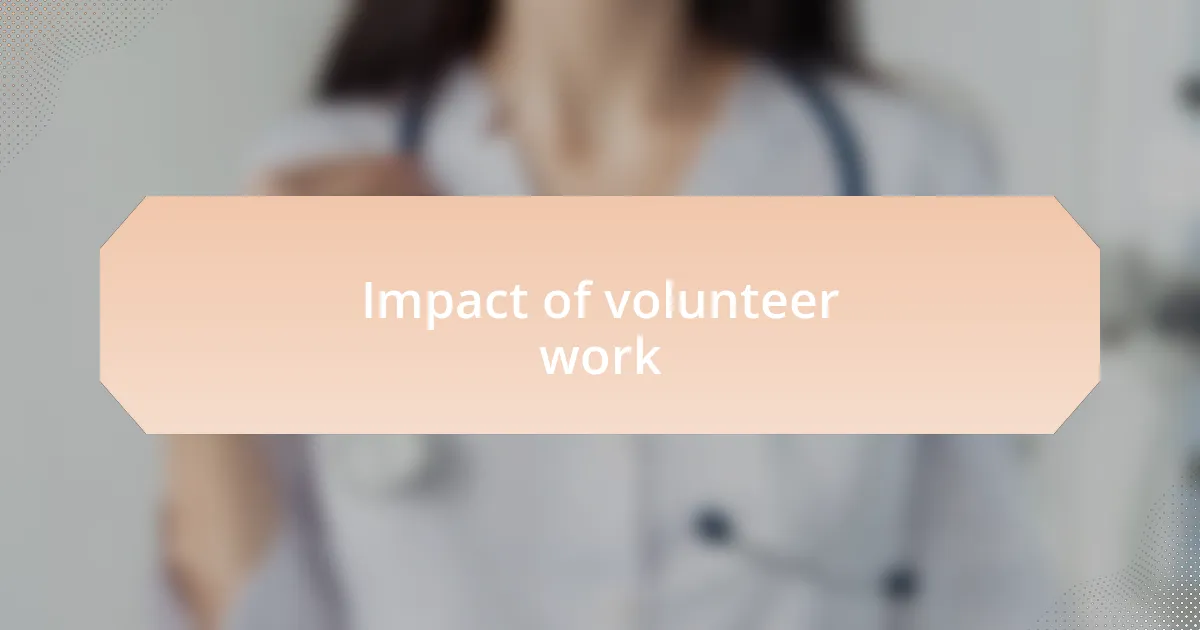
Impact of volunteer work
When I think about the impact of volunteer work, I often remember a day spent at the hospital when I met a young volunteer who was there for his first shift. Despite his nerves, he quickly found joy in playing cards with an elderly patient. Seeing the laughter shared between them reminded me that such simple interactions can significantly uplift someone’s spirit during their darkest hours. Have you noticed how even a brief moment of joy can create ripples of encouragement for those in need?
In my own time volunteering, I’ve observed that when volunteers actively engage with patients, it creates a nurturing atmosphere. One afternoon, I witnessed a group of volunteers singing alongside patients—transforming the sterile environment into a joyful gathering place. It struck me how effectively music can create a bridge for connection, sparking smiles and rekindling hope in hearts that felt heavy. Isn’t it interesting how volunteer efforts can redefine what healing looks like, going beyond medical treatment?
Volunteering also creates a profound sense of purpose for those involved. During a particularly busy week, I absorbed the stories of multiple patients, each one unique yet interwoven with a common thread of resilience. I remember leaving the hospital feeling energized, reflecting on how my small contributions made a difference. Isn’t it inspiring to think that through volunteer work, we can not only impact others but also enrich our own lives in the process?
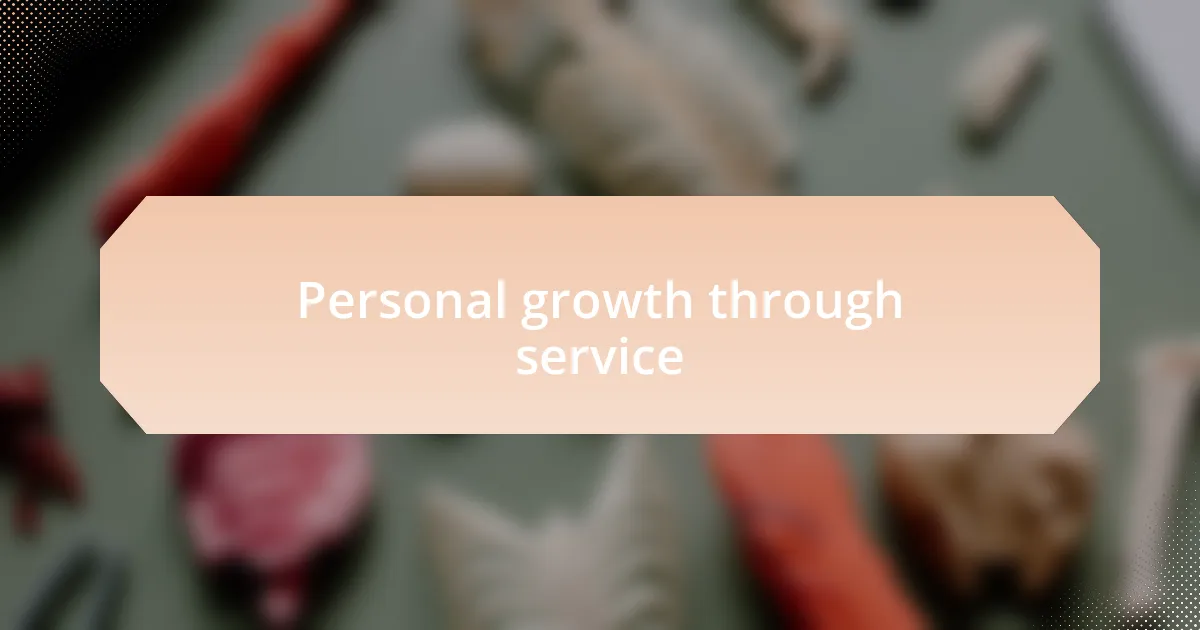
Personal growth through service
Engaging in service has profoundly shaped my perspective on life and personal growth. I recall an evening spent supporting patients and their families during a support group. Listening to their stories—some heartbreaking, others filled with hope—deepened my empathy. This experience made me realize how stepping into another’s shoes can foster a sense of strength and resilience within myself. Have you experienced moments that made you question your own understanding of compassion?
Every interaction in a hospital setting challenges me to become a better version of myself. I remember volunteering for an event where we handed out care packages and shared smiles with families in distress. Seeing their gratitude was a powerful reminder that even small acts can elicit profound change. It compels me to reflect on how little things really matter and how they can ignite growth in our own lives. Isn’t it fascinating how giving can sometimes teach us more than receiving?
Throughout my journey in volunteer work, I’ve found that service is a unique pathway to self-discovery. One quiet afternoon, I helped a hospice patient organize her photo albums, unfolding her life’s journey through the images. I couldn’t help but feel a bittersweet connection as she laughed and cried over memories. Each moment spent serving has taught me not just about others but also about my own vulnerabilities and strengths. How can we transform our struggles into lessons for ourselves and others?
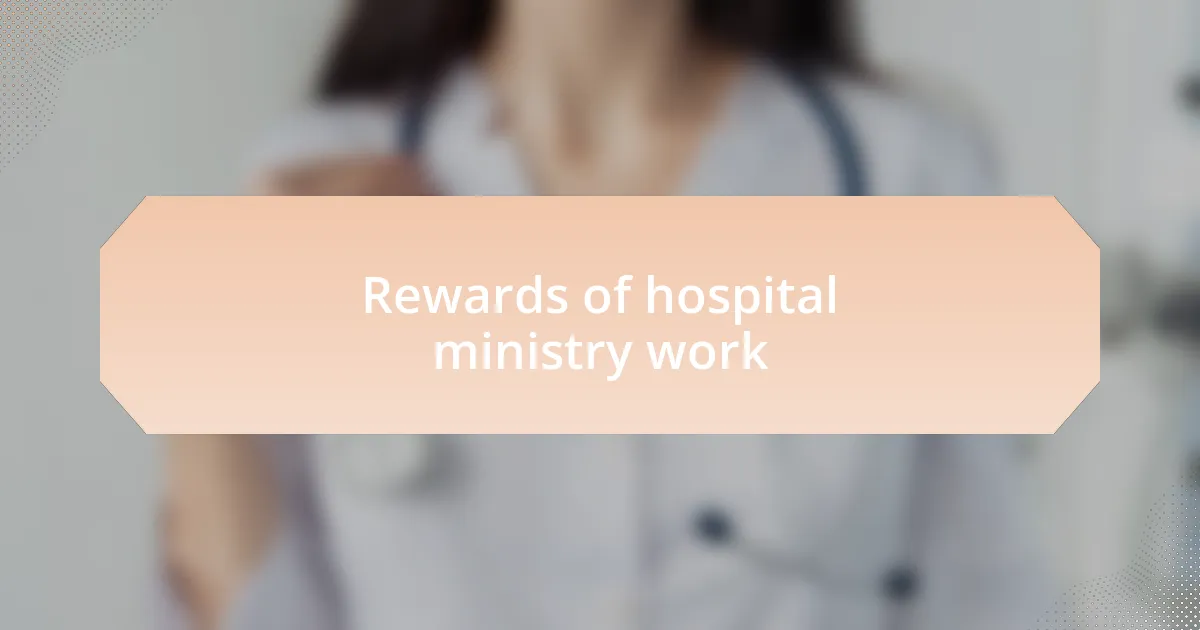
Rewards of hospital ministry work
Hospital ministry work brings a profound sense of fulfillment that goes beyond traditional volunteering. I remember sitting with a patient who was scared about her upcoming surgery. Holding her hand, I reassured her that she wasn’t alone. The gratitude in her eyes was rewarding; it reminded me that sometimes just being there is the greatest gift we can offer. How often do we realize that our presence alone can provide comfort to someone in distress?
The relationships I’ve formed through hospital ministry are incredibly uplifting. I once spent time with a young boy undergoing treatment, sharing jokes and stories to lighten his day. His laughter, amidst a challenging time, filled me with joy and hope. These bonds serve as a constant reminder that healing is not only physical but emotional. Isn’t it amazing how a shared moment can impact both the giver and receiver in such profound ways?
Every day in hospital ministry presents unique opportunities for compassion. When I lead prayer sessions, the collective hope and resilience from the attendees serve as a source of strength. I often leave these gatherings feeling more connected to the community and enriched by shared stories of faith. Do you ever find that the moments spent serving can echo within your heart long after the act is completed?